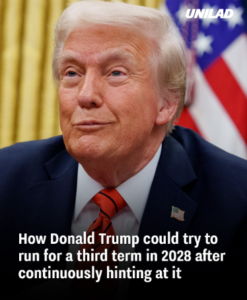As of February 2025, former President Donald Trump has completed two terms in office, the maximum allowed under the 22nd Amendment of the U.S. Constitution. Despite this constitutional limitation, Trump has occasionally hinted at the possibility of seeking a third term in 2028. For instance, during a House Republican retreat, he joked, “Am I allowed to run again?”
Constitutional Constraints
The 22nd Amendment explicitly prohibits any individual from being elected to the presidency more than twice. This means that, under current law, Trump cannot run for a third term in 2028.
Potential Avenues for a Third Term
While the constitutional barrier is clear, there are theoretical avenues that could allow a former president to serve beyond two terms:
-
Constitutional Amendment: Amending the 22nd Amendment would require a two-thirds majority in both the House and Senate, followed by ratification from three-fourths of the states. This is a challenging and lengthy process.
-
Vice Presidency Path: Some have speculated that Trump could run for vice president in 2028 and, if elected, assume the presidency if the sitting president were to vacate the office. However, this interpretation is contentious and would likely face significant legal challenges.
Public Perception and Political Feasibility
Public reaction to Trump’s musings about a third term has been mixed. Some view his comments as mere speculation or political posturing, while others express concern over potential constitutional challenges. For example, “The View” co-host Sunny Hostin remarked that Trump might consider himself his own successor, referencing a proposal by Rep. Andy Ogles to amend the Constitution and allow Trump to serve a third term.
Conclusion
While the idea of Donald Trump seeking a third term in 2028 is intriguing, it faces significant constitutional and legal hurdles. Any attempt to pursue this path would require substantial legal challenges and public support, making it an unlikely scenario under current laws.

